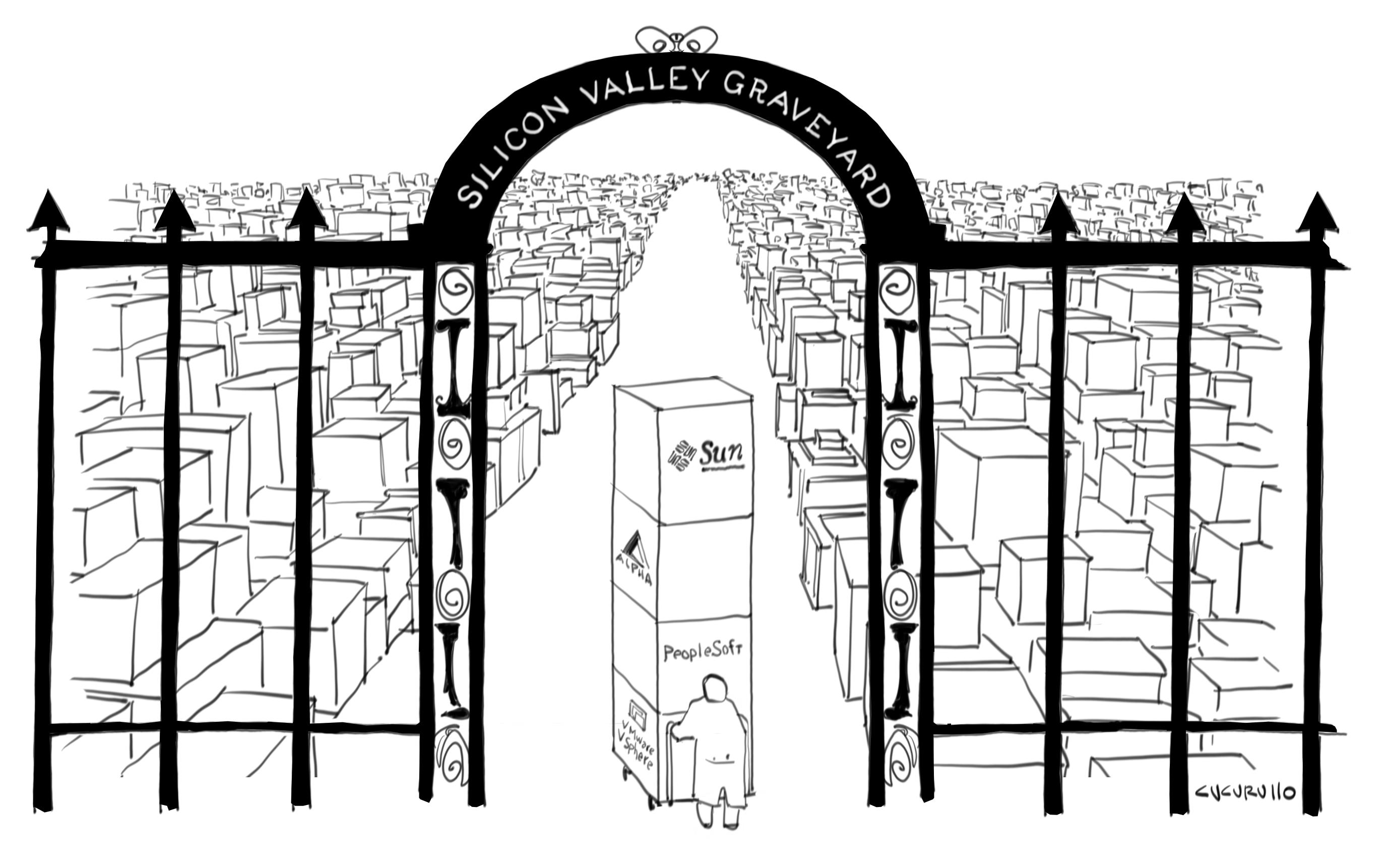Digital Equipment Corporation (DEC), Peoplesoft, Sun Microsystems, and now VMware – all these companies share a curious fate. Once dominant forces in Silicon Valley, leading the charge in innovation, they've all fallen from grace. These giants, each representing a different chapter in the Valley's history, were once the undisputed leaders in their respective fields, leaving a lasting impact on American industry and Western civilization.
Great Technology Companies of Western Civilization: Why Did They Disappear?
 Cras eget sem nec dui volutpat ultrices.
Cras eget sem nec dui volutpat ultrices.
However, despite their past successes, each company ultimately met its downfall.
EACH COMPANY HAS ITS OWN SAD STORY
The Fall of American Industry's Giants
Many of America's once-great companies share a tragic fate. Founders, shareholders, and boards of directors, lost in a self-important haze, strayed from the core strengths that built these giants. Diversification into frivolous ventures weakened their ability to thrive. This, however, is just one symptom of a larger disease.
The darkest corners of capitalism, fueled by the hubris of those who control the capital, ultimately consumed these historic icons. As Karl Marx famously wrote in "Das Kapital," "Those who control the capital control everything." Capitalism, the engine of modern industry, can become its own executioner.
The story starts with promise. The House of Medici, inspired by micro-finance after the 14th century Black Death, laid the groundwork for the free-market principles that would later earn 20th-century economists Nobel Prizes. But centuries later, capitalism's dark side took hold.
FREE ENTERPRISE: Fueling Innovation and Achievement
Free enterprise ignites a spirit of accomplishment alongside the pursuit of profit. It emboldens the daring to chase audacious goals, often unleashing bursts of genius that propel advancements in material goods, artistic expression, and social progress. This system is the engine behind the immense wealth creation witnessed over the past 650 years. Free enterprise fosters the birth of companies like DEC, Sun, Peoplesoft, and VMware.
However, this same system can also incentivize talented individuals to collaborate with entities focused primarily on profit. Even government agencies like NASA can operate within a free enterprise framework. Ultimately, the individual chooses their path, and the resulting achievements can be remarkable.
Capital serves as the lifeblood of these endeavors. However, as even Karl Marx recognized in a rare moment of clarity, an unchecked pursuit of self-enrichment can devour these very success stories. While such practices may not be inherently illegal, the manipulation of markets and financial systems can lead to monopolies. These predatory behemoths, consuming everything in their path, represent a violation of the natural order of commerce. But that's a discussion for another time.
DARK CORNER OF CAPITALISM
The capitalist narrative often celebrates innovation and progress. But beneath the surface, a different story unfolds. Here, corporations ruthlessly exploit loopholes, prioritize profit over potential, and stifle the very achievements they claim to champion.
The chilling aspect? These actions are perfectly legal, widely accepted, and immensely profitable. The true cost to humanity? A mystery forever shrouded in the shadows.
WHAT COULD HAVE BEEN
Imagine a world where:
DEC Continued to Shine: Many consider DEC's operating system a masterpiece. Had it thrived, could it have pioneered virtual machines (VMs) as we know them today?
Peoplesoft Challenged SAP: Peoplesoft's innovative application software had the potential to rival giants like SAP. Would they have remained a leader with independent growth?
Sun's Java Took the Next Step: Sun Microsystems, creators of Java and the minicomputers that powered Wall Street, could have revolutionized software development further.
Netscape Ushered in a New Era: Netscape, a pioneer in web browsing, might have driven even more significant software innovation, potentially rivaling the importance of relational databases.
These four American tech giants faced downfalls, and with them, potentially groundbreaking advancements. While the reasons are debated, the true loss lies in the unfulfilled potential for humanity-changing innovations. Did the "monetization to the point of disintegration" stifle progress from these "idols of innovation" in Silicon Valley? We'll never truly know what inventions were lost in the morning mist.

Lucian Wilde20 Posts
Lucian Wilde is a master of fantasy, crafting richly imagined worlds populated by mythical creatures and epic heroes. His intricate world-building and vivid descriptions transport readers to realms where magic reigns supreme.










0 Comments